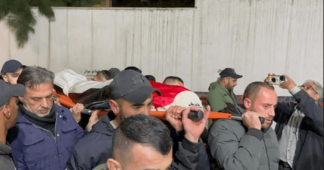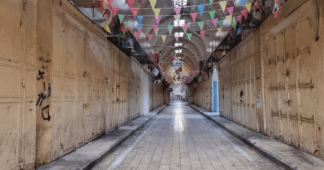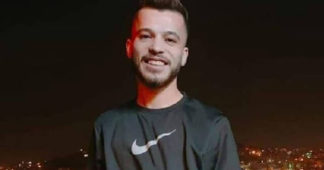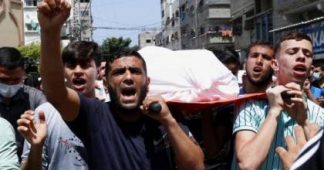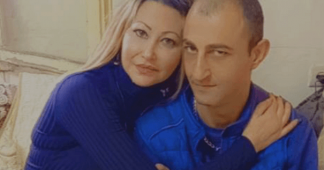By 3 July 2023
Israeli forces have killed at least eight Palestinians during an ongoing major military offensive in the northern occupied West Bank city of Jenin – the largest operation in the territory since 2002.
Hundreds of Palestinians were streaming out of Jenin refugee camp in yet another chapter of displacement as Monday came to a close. The Israeli military denied that it had ordered the evacuation of part of the camp. The Palestine Red Crescent Society said that it evacuated 3,000 Palestinians from the camp.
At least two of those killed since early Monday were civilians, according to the Palestinian Center for Human Rights.
Defense for Children International-Palestine said that two of those killed were children: Nour al-Deen Marshoud, 15, and Majdi Ararawi, 17.
Ayed Abu Eqtaish, a program director for the children’s rights group, called on Karim Khan, chief prosecutor of the International Criminal Court, to “at a minimum issue a preventative statement in an effort to deter ongoing Israeli war crimes.”
Al-Haq, a Palestinian human rights group, called on third states to “stop empty verbal condemnations and implement concrete measures to end Israel’s impunity.”
5/ Decades of international impunity for Israel sends a message: willful killings, destruction & other violations go unpunished. Human rights violations, war crimes and crimes against humanity cannot be normalised. Israel cannot continue to evade accountability. #EndImpunity
— Al-Haq الحق (@alhaq_org) July 3, 2023
The invasion began at around 1 am on Monday when Israeli forces moved into Jenin and its refugee camp and closed off the camp entrances, “isolating it from the city,” PCHR added, while Israeli airstrikes targeted civilian infrastructure.
Four Palestinian fighters were killed as residents attempted to repel the invading forces. PCHR identified them as Nour al-Deen Marshoud, Sameeh Abu al-Wafa, Aws al-Hanoun and Husam Abu Thibah.
One or more Israeli snipers executed three Palestinians whose bodies were seen piled on top of each other on a street in Jenin refugee camp in videos and photos that circulated on social media.
The first shot was fired at Ali al-Ghoul, 20, who was hit in the chest, according to PCHR. When Majdi Ararawi, 17, attempted to pull al-Ghoul out of the street, he was shot in the head by a sniper. The third man, Muhammad al-Shami, 18, was hit when he attempted to evacuate the other wounded men.
“The three of them were left to bleed for more than half an hour when people managed to pull them inside one of the houses,” according to PCHR. By then, all three were dead.
The Palestinian health ministry in the West Bank reported at least 28 injuries, mostly among civilians, with nine in critical condition.
In addition to those killed in the ongoing incursion in Jenin, 21-year-old Muhammad Hassanein was shot in the head and killed before dawn on Monday during a protest against the raid in Jenin near Beit El settlement in the central West Bank.
Civilian infrastructure destroyed
Israel has destroyed civilian infrastructure and troops have targeted paramedics and journalists during the Jenin invasion, which Israeli officials said could last for two or three days.
Videos showed Israeli military vehicles ripping up roads in Jenin refugee camp and the widespread destruction left in their wake:
شاهد| جرافات الاحتلال تواصل تدمير الشوارع والمركبات في محيط وداخل مخيم جنين. pic.twitter.com/NEZ6lQS1CT
— شبكة قدس الإخبارية (@qudsn) July 3, 2023
قوات الاحتلال تدمر وتعيث شوارع مخيم جنين خراباً pic.twitter.com/ujTRiNmmFH
— وكالة شهاب للأنباء (@ShehabAgency) July 3, 2023
جانب من الدمار الذي خلفته جرافات الاحتلال خلال العدوان على جنين. pic.twitter.com/tYsZiWipmK
— وكالة شهاب للأنباء (@ShehabAgency) July 3, 2023
The municipality of Jenin said that its water supply was cut off after Israeli troops destroyed infrastructure. Defense for Children International-Palestine said that camp residents were also shut off from electricity and telecommunications.
The Palestine Red Crescent Society said that Israeli troops blocked roads and intercepted ambulances trying to enter the refugee camp.
الاحتلال يعيق ويمنع طواقم الإسعاف من الدخول إلى حارة الدمج في جنين لنقل المصابين pic.twitter.com/SuVXCfIm9b
— وكالة شهاب للأنباء (@ShehabAgency) July 3, 2023
Red Crescent director Ahmed Jebril told the UK charity Medical Aid for Palestinians that “ambulances came under direct fire” and were obstructed after Israeli bulldozers destroyed main roads in the camp.
Video also showed Palestinians reacting to tear gas fired outside of the Jenin governmental hospital:
تغطية صحفية:"قوات الاحتلال تطلق قنابل الغاز صوب مستشفى جنين الحكومي". pic.twitter.com/wTMa2BpQ7n
— وكالة شهاب للأنباء (@ShehabAgency) July 3, 2023
The World Health Organization in the West Bank and Gaza condemned as “deplorable” the “ongoing attacks against health care, including [the] prevention of access to persons critically injured.”
Ongoing attacks against health care, including prevention of access to persons critically injured, are deplorable.@WHO calls for respect and protection of #health care, including safe passage to health services in #Jenin and across Palestine.#NotATarget #HealthIsARight
— WHO in occupied Palestinian territory (@WHOoPt) July 3, 2023
@PalestineRCS confirms Israeli soldiers have also detained two of their ambulances in Jenin. See also this video documenting damage from Israeli gunfire to AlAmal hospital in Jenin. https://t.co/tVWfZkW6TK pic.twitter.com/FC6bZJ8xJr
— Nour Odeh 🇵🇸 #NojusticeNopeace (@nour_odeh) July 3, 2023
WAFA reported that Israeli forces rammed an ambulance attempting to enter Jenin refugee camp in order to transport a woman in labor to a hospital.
Journalists attacked
Journalists also came under attack.
Video shows an Israeli sniper firing directly at a camera on a tripod belonging to the crew of Al-Araby TV, in what the broadcaster said was a deliberate attack:
Watch carefully how #Israeli soldiers directly, deliberately & surgically shoot at journalists' cameras in Jenin!
The soldier opens the vehicle's door, proving he's under ZERO danger, then takes potshots at the camera until it's fully destroyed!
9 people killed, 50 wounded… pic.twitter.com/Lek7AUQI36
— Muhammad Shehada (@muhammadshehad2) July 3, 2023
تغطية صحفية: "معدات الصحفيين التي جرى تدميرها بعد استهدافها من قبل الاحتلال في جنين". pic.twitter.com/5Y9MginjGd
— وكالة شهاب للأنباء (@ShehabAgency) July 3, 2023
Just over a year ago, an Israeli sniper shot and killed Shireen Abu Akleh, a longtime correspondent for Al Jazeera, during a raid in Jenin. No one has been held accountable for her death.
Last year they killed my aunt #ShireenAbuAkleh in #Jenin and today they continue to target journalists…this is what lack of accountability and impunity looks like. https://t.co/KHdNBE66IN
— Lina Abu Akleh (@LinaAbuAkleh) July 3, 2023
Another video from Monday’s invasion shows an Israeli soldier smashing a hole in the wall of a building housing lawyers’ offices so it could be used as a sniper’s position:
شاهد | انتشار لقناصة الاحتلال على أسطح المباني في مخيم جنين. pic.twitter.com/SzSrFY4ubp
— وكالة شهاب للأنباء (@ShehabAgency) July 3, 2023
WAFA, the official Palestinian news agency, said that the internationally celebrated Freedom Theater in Jenin refugee camp was hit in a drone missile strike, injuring a child.
The director of the theater, where families had taken refuge, said that the Israeli military bulldozed roads and a memorial for Palestinians killed in the camp near the theater’s entrance.
Update From Mustafa Sheta: The yard of The Freedom Theatre has been bombed, dozens of residents in Jenin camp live all around. They are trying to flee their homes because of the bombing that is targeting anything living in the camp. At least 7 people have been killed so far pic.twitter.com/jf9ragKl3f
— The Freedom Theatre (@freedom_theatre) July 3, 2023
Defense for Children International-Palestine said that in addition to the Freedom Theater, several mosques and the Jenin Sport Club were bombed.
The Israeli military claimed that it found a cache of weapons in tunnels underneath a mosque that was used as a hideout by fighters.
The army also says troops found a workshop for making explosives and that it confiscated parts of a rocket launcher.
Twenty Palestinians have been arrested as soldiers search for weapons in houses in the camp, Israeli media reported. Defense for Children International-Palestine said that “many Palestinian children” were detained.
Early in the invasion, Israeli forces targeted what they said was a command center and safehouse for fighters in the refugee camp.
The military operation was reportedly approved more than a week ago and Israeli officials gave their US counterparts advance notice, according to Israeli media.
The White House on Monday gave its support for “Israel’s security and right to defend its people against Hamas, Palestinian Islamic Jihad and other terrorist groups.”
Extremist figures in Benjamin Netanyahu’s far-right government have long agitated for a major operation targeting Jenin – a stronghold of armed resistance in the West Bank aimed at hindering Israeli colonization and rendering the military occupation untenable.
That pressure became acute after four Israelis were killed in a settlement and after a seemingly routine arrest raid in Jenin in late June went awry when an armored vehicle was incapacitated by a roadside bomb detonated by Palestinian fighters.
During last month’s raid, Israel deployed an Apache attack helicopter in the West Bank for the first time in around two decades in order to evacuate ambushed troops. Seven Palestinians, including two children, were killed in the raid.
The ambush marked an advancement in the military capabilities of fighters in the West Bank, with Palestinians comparing it to the resistance that helped lead to Israel’s unilateral withdrawal of its settlers from the Gaza Strip in 2005 and redeployment of the military to the periphery of the territory.
Israel’s ultranationalist national security minister Itamar Ben-Gvir, speaking at a notorious settlement outpost in the northern West Bank, recently called for “a military operation taking down buildings and killing terrorists.”
“Not one or two, but dozens and hundreds, and if need be thousands!” he said, adding that such slaughter was necessary to secure exclusive Jewish rule from the Jordan River to the Mediterranean sea.

Anshel Pfeffer, a correspondent writing for the Tel Aviv daily Haaretz, said the Jenin operation “is probably larger than the [Israeli military] would have envisaged if it didn’t also have to supply a fireworks display for the politicians.”
Pfeffer added that “it certainly isn’t what Ben-Gvir and his cohorts have been demanding, but it at least allows Netanyahu to look as if he’s acting decisively and his partners to claim that they have shifted the paradigm.”
The operation has been met with the approval of Yair Lapid, the opposition leader in Israel, who described it as “justified and necessary” and said that the goal was not to further undermine the already weakened Palestinian Authority
“Symbol of the struggle”
Ismail Haniyeh, the head of Hamas’ political bureau, called on Palestinians in the West Bank to come to Jenin’s aid, adding that “the blood spilled in Jenin will decide the next phase in all directions and on all axes.”
Salah al-Arouri, the head of Hamas’ political bureau in the West Bank, called on “all fighters in the West Bank to fight with all means at their disposal to protect Jenin and the al-Aqsa mosque.”
Islamic Jihad said that Israel would not succeed in its aims to disarm Jenin, adding that the city “will remain the symbol of the struggle and the firm stand against the occupation.”
Al Jazeera reported on Monday that Palestinian resistance factions in Gaza called on the public “to rally around Jenin, raising the possibility of a stronger Palestinian response to the strengthening Israeli operations.”
Jenin refugee camp is densely populated, with 14,000 Palestinians living in less than half a square kilometer – smaller than a quarter square mile.
The camp is one of dozens in the West Bank, Gaza and nearby countries housing millions of Palestinians who were forced from their homes and land before, during and after the establishment of the state of Israel in 1948 and their descendants.
Israel denies Palestinian refugees their right to return to their homes and property because they are not Jews in its drive to engineer a demographic majority.
The ongoing incursion in Jenin refugee camp has disturbing parallels to Israel’s 2002 invasion, during which at least 52 Palestinians and 23 Israeli soldiers were killed.
The Israeli military left “a landscape of ruin,” with “the smell of death” permeating the camp, according to a witness to the aftermath of the 11-day siege. More than 400 houses were destroyed, displacing a quarter of the camp’s population, according to UNRWA, the UN agency for Palestine refugees.
Some observers have described Israel’s multiple deadly raids in Jenin and its surroundings during the past year and a half as an incremental massacre:
The death toll continues to rise in Jenin. So far 7 Palestinians have been killed by Israeli forces, including 3 as a result of air strikes. Videos are showing bodies piling up in the streets. Every few weeks the same event is replayed. A prolonged massacre is being carried out. https://t.co/19i2ErzT7q
— Yumna (@yumna_patel) July 3, 2023
More than 180 Palestinians have been killed by Israeli troops, police and settlers in the West Bank and Gaza so far this year, or died from injuries sustained previously, according to The Electronic Intifada’s tracking.
Nine Palestinian children have been killed by Israeli forces in the Jenin area since the beginning of the year, according to Defense for Children International-Palestine.
In the same period, 28 people have been killed by Palestinians in Israel and the West Bank in occupation-related violence, or died from previous injuries.
We remind our readers that publication of articles on our site does not mean that we agree with what is written. Our policy is to publish anything which we consider of interest, so as to assist our readers in forming their opinions. Sometimes we even publish articles with which we totally disagree, since we believe it is important for our readers to be informed on as wide a spectrum of views as possible.
